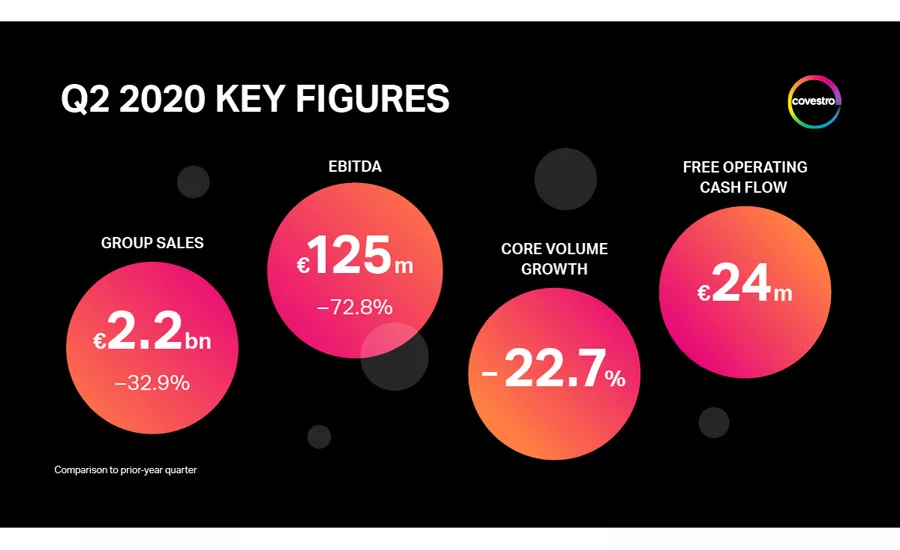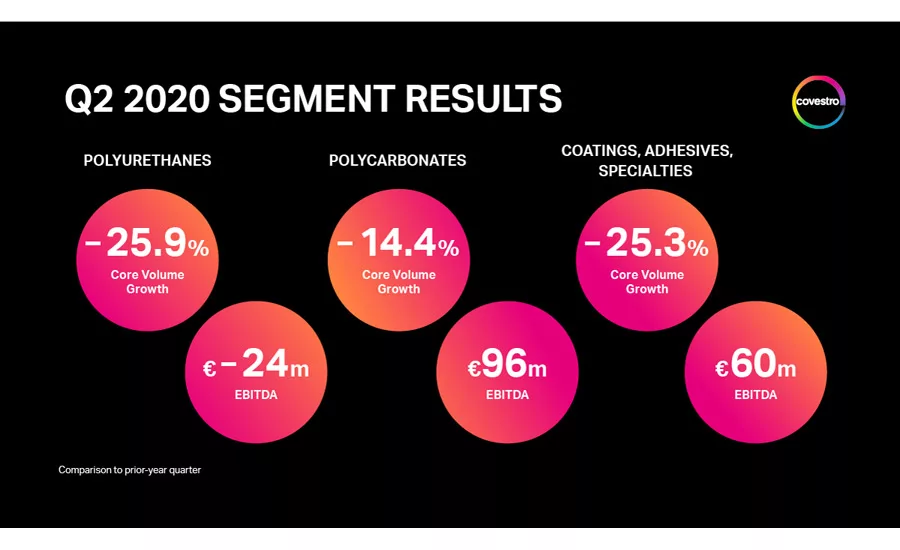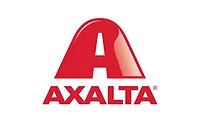Pandemic Significantly Impacts Covestro’s Second-Quarter Results


LEVERKUSEN, Germany — Covestro’s business performance in the second quarter was, as expected, significantly impacted by the further spread of the coronavirus pandemic in Europe and North America. Core volumes decreased by 22.7% year-on-year from April to June due to the massive drop in demand in all key customer industries. The global coronavirus pandemic drove down core volumes with strongest volume impact in April and sequential improvement since mid-May. Group sales fell accordingly by 32.9% to around €2.2 billion (previous year: €3.2 billion). Sales in the EMLA and NAFTA regions declined more sharply than in the APAC region, mainly due to the time lag in the impact of the pandemic. As communicated in the ad-hoc statement on the preliminary key financial results on July 9, 2020, Group EBITDA was €125 million (–72.8%) and thus above market expectations for the second quarter of 2020 at the time of publication. That was attributable in particular to an accelerated recovery in demand, especially in the Polycarbonates segment, in June. Net income for the second quarter was –€52 million (previous year: €189 million). In contrast to the decline in EBITDA, free operating cash flow (FOCF) rose to €24 million (previous year: –€55 million) as a result of strict liquidity management.
“As anticipated, the global coronavirus pandemic had a significant impact on our results in the second quarter,” said Dr. Markus Steilemann, CEO of Covestro. “We took the right measures in timely fashion to protect our employees, maintain production and supply chains, and ensure continuous supply to our customers. We have managed to accomplish that very successfully to date and will continue to steer Covestro resolutely through this crisis.”
The company confirmed the full-year guidance it had revised in April. However, the uncertainties associated with the consequences of the coronavirus pandemic for economic development remain high.
Consistent Crisis Management and Strengthening of Liquidity Position
Covestro also took further financing measures in the second quarter to sustainably strengthen its liquidity position. The company placed Eurobonds with a total volume of €1.0 billion in the capital markets on June 5, 2020. The bonds will be maturing in February 2026 and June 2030 and pay a coupon of 0.875% and 1.375% respectively. Investor demand was exceptionally high, with the orderbook being more than 10 times oversubscribed.
“Although COVID-19 is having a significant impact on our business performance, our consistent actions are already showing an effect,” said Dr. Thomas Toepfer, Covestro’s CFO and Labor Director. “2020 remains an exceptional year and the further development is still not fully foreseeable. That is a further reason why we will stick to our clear course with its focus on efficiency, cost awareness and securing our liquidity.”
In view of the situation, Covestro’s Board of Management, Supervisory Board and workforce are also making a joint solidarity contribution in order to enhance the company’s resilience in the current environment. For Covestro’s German companies, the Board of Management and employee representatives have agreed on a model to reduce working hours and remuneration for all employees by the end of November 2020. All of Covestro’s Group companies outside Germany are implementing comparable country-specific cost-saving measures.
New Corporate Vision: Accelerate Orientation Towards a Circular Economy
Covestro presented its new long-term vision in May 2020. The company intends to fully align its entire production, its product and solution portfolio and all areas in the long term to the circular concept. The strategic program, which was already launched in 2019, aims to anchor circularity in all areas of the company in a holistic approach. It is now being successively implemented and backed up with concrete and measurable goals. It focuses in particular on the four topics of alternative raw materials, innovative recycling, joint solutions and renewable energies.
All Segments Affected by Sales Decline Due to Coronavirus
The Polyurethanes segment saw core volumes in the second quarter of 2020 decline significantly by 25.9% compared to the prior-year quarter (previous year: 0.7%) due to the coronavirus pandemic, a trend that affected all key customer industries. Sales were down 38.7% to €913 million, mainly due to a decline in total volumes sold and lower average selling prices. Declining volumes and lower margins overall resulted in an EBITDA of –€24 million (previous year: €172 million).
In the second quarter of 2020, core volumes in the Polycarbonates segment fell by 14.4% over the prior-year quarter (previous year: 4.4%). Decreased volumes as a result of significant drops in demand from the automotive and transport industries were cushioned by a lower decline in volumes from the electrical, electronics and household appliances industries and volume growth in the construction industry. Sales decreased to €648 million (–27.8%) on account of a decline in total volumes sold and lower average selling prices. EBITDA consequently fell by 37.7% to €96 million.
Core volumes in the Coatings, Adhesives, Specialties segment were down 25.3% compared to the prior-year quarter (previous year: –4.7%). The coronavirus pandemic resulted in far weaker demand from key customer industries, a trend that was reflected in particular in a downturn in volumes in the automotive and transport industries. Sales fell by 28.7% to €443 million, mainly due to a decline in total volumes sold and lower average selling prices. EBITDA decreased by 60.0% to €60 million on the back of lower volumes and margins.
First Half of 2020 Marked by Coronavirus
As expected, the effects of the coronavirus pandemic significantly impacted the figures for the first half of 2020. Core volumes decreased by 13.6%, and group sales fell by 22.7% to around €4.9 billion (previous year: €6.4 billion). That is mainly attributable to lower total volumes and a decline in the level of selling prices. EBITDA consequently dropped by 57.9% to €379 million, while net income totaled –€32 million (previous year: €368 million). FOCF in the first half of 2020 declined to –€225 million (previous year: –€100 million).
Looking for a reprint of this article?
From high-res PDFs to custom plaques, order your copy today!






